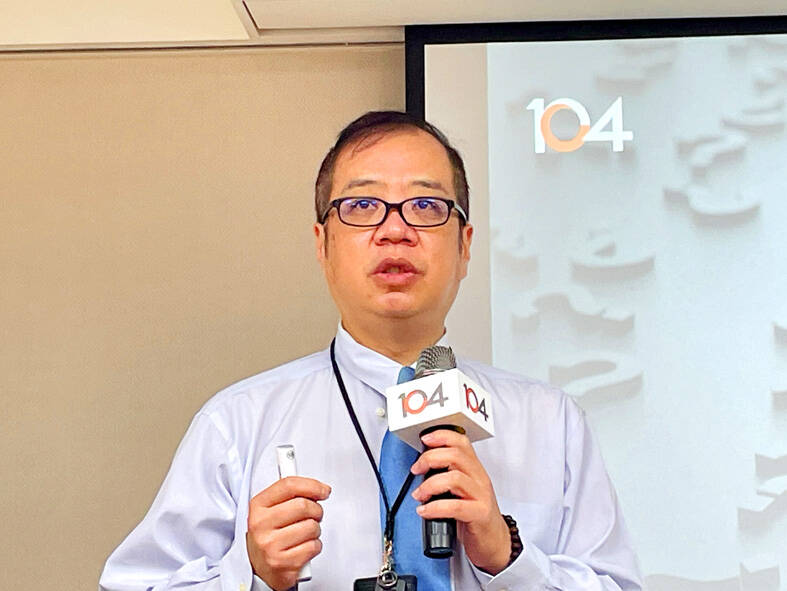The average yearly wage in Taiwan has risen to a seven-year high of NT$677,000 (US$21,689) this year, as inflation and labor shortages have spurred companies to raise overall compensation, online human resources platform 104 Job Bank (104人力銀行) said yesterday.
The figure represents a 3.1 percent hike from a year earlier, with semiconductor manufacturers topping the survey with an average annual wage of NT$969,000, followed by telecoms at NT$841,000 and electronics suppliers at NT$820,000, the job bank said.
Despite excess capacity in the semiconductor sector in the second quarter, the industry has been in a favorable position for at least three years and remains highly profitable, 104 Job Bank consultant Stanley Hua (花梓馨) told a news conference in Taipei.

Photo: Ou Yu-hsiang, Taipei Times
That position, coupled with a persistent brain drain that has driven companies to compete for talent by offering higher salaries sometimes across borders, has resulted in the semiconductor sector offering the highest average pay, he said.
That explains why integrated circuit (IC) design engineers enjoy the highest average annual salary at NT$1.37 million, followed by digital IC engineers at NT$1.28 million and IC layout engineers at NT$1.08 million, the job bank said, adding that such firms have raised wages and perks to recruit and retain talent to meet technology upgrade and capacity expansion needs.
However, the average pay in the financial sector is expected to decline 7.9 percent this year, due to insurance companies paying compensation to people who purchased COVID-19 policies and falling turnover on the Taiwan Stock Exchange, which is down 31 percent year-on-year, the job bank said.
The average annual wage in the electronic components manufacturing sector is expected to fall 2.6 percent due to an economic slowdown and 1.9 percent in the construction sector due to falling property sales caused by rising interest rates, it said.
Meanwhile, 95.9 percent of Taiwanese firms plan to distribute year-end bonuses equivalent to 1.33 months of wages, the job bank said, adding that the figure is 0.23 months higher than the amount recorded last year.
The survey showed that 49.1 percent of Taiwanese firms are looking at business decline next year and only 23.5 percent hold positive views.
The job bank cited an economic slowdown at home and abroad as the main drag on business sentiment.
Some firms expect a recovery to take place in the third quarter of next year, but others believe the downturn would persist until the fourth quarter, it said.
Additional reporting by CNA

Nvidia Corp chief executive officer Jensen Huang (黃仁勳) on Monday introduced the company’s latest supercomputer platform, featuring six new chips made by Taiwan Semiconductor Manufacturing Co (TSMC, 台積電), saying that it is now “in full production.” “If Vera Rubin is going to be in time for this year, it must be in production by now, and so, today I can tell you that Vera Rubin is in full production,” Huang said during his keynote speech at CES in Las Vegas. The rollout of six concurrent chips for Vera Rubin — the company’s next-generation artificial intelligence (AI) computing platform — marks a strategic

SEMICONDUCTORS: The German laser and plasma generator company will expand its local services as its specialized offerings support Taiwan’s semiconductor industries Trumpf SE + Co KG, a global leader in supplying laser technology and plasma generators used in chip production, is expanding its investments in Taiwan in an effort to deeply integrate into the global semiconductor supply chain in the pursuit of growth. The company, headquartered in Ditzingen, Germany, has invested significantly in a newly inaugurated regional technical center for plasma generators in Taoyuan, its latest expansion in Taiwan after being engaged in various industries for more than 25 years. The center, the first of its kind Trumpf built outside Germany, aims to serve customers from Taiwan, Japan, Southeast Asia and South Korea,

REVENUE PERFORMANCE: Cloud and network products, and electronic components saw strong increases, while smart consumer electronics and computing products fell Hon Hai Precision Industry Co (鴻海精密) yesterday posted 26.51 percent quarterly growth in revenue for last quarter to NT$2.6 trillion (US$82.44 billion), the strongest on record for the period and above expectations, but the company forecast a slight revenue dip this quarter due to seasonal factors. On an annual basis, revenue last quarter grew 22.07 percent, the company said. Analysts on average estimated about NT$2.4 trillion increase. Hon Hai, which assembles servers for Nvidia Corp and iPhones for Apple Inc, is expanding its capacity in the US, adding artificial intelligence (AI) server production in Wisconsin and Texas, where it operates established campuses. This

Garment maker Makalot Industrial Co (聚陽) yesterday reported lower-than-expected fourth-quarter revenue of NT$7.93 billion (US$251.44 million), down 9.48 percent from NT$8.76 billion a year earlier. On a quarterly basis, revenue fell 10.83 percent from NT$8.89 billion, company data showed. The figure was also lower than market expectations of NT$8.05 billion, according to data compiled by Yuanta Securities Investment and Consulting Co (元大投顧), which had projected NT$8.22 billion. Makalot’s revenue this quarter would likely increase by a mid-teens percentage as the industry is entering its high season, Yuanta said. Overall, Makalot’s revenue last year totaled NT$34.43 billion, down 3.08 percent from its record NT$35.52